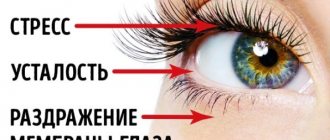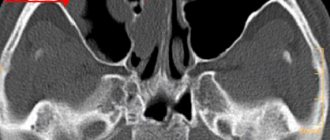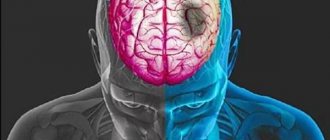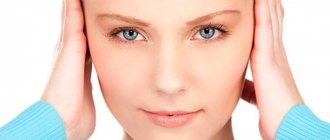A nervous tic is a sudden, repetitive movement that occurs as a result of involuntary contraction of a specific muscle group. For example, it is often said that “the eye twitches.” Twitching can affect different muscles, spread from one muscle group to another, and even cover almost the entire body.
Movements during tics are obsessive and a person cannot control them. When you try to suppress a tic, the tension increases and as a result the tic only gets worse.
The most common tic occurs in childhood, and it is detected somewhat more often in boys than in girls. It is believed that tics occur in 13% of boys and 11% of girls.
Causes of nervous tics
The causes of tics are usually grouped as follows:
- primary tics
caused by psychogenic factors. In this case, there are no organic pathologies. The occurrence of a tic can be caused by stress, fear, depression, and neurosis. It is this type of tics that most often occurs in children. The cause of a nervous tic in a child can be psycho-emotional trauma, increased anxiety, obsessive fear, attention deficit hyperactivity disorder (ADHD); - secondary tics
. In this case, the tic is a consequence of any diseases that cause disruption of brain activity. These may be infectious diseases (encephalitis), intoxication, brain injury, cerebrovascular accidents; - hereditary tics.
Causes
The following factors can cause a nervous tic of the eye:
– a disorder of the emotional field in the form of neurosis, overstrain, excessive mental stress (considered the most common etiological factor, because almost any stressor can cause blepharospasm);
– organic diseases of the brain, for example, eye hyperkinesis often accompanies vegetative-vascular dystonia, multiple sclerosis, brain tumors, cerebral hemodynamic disorders;
– brain injuries or previous infectious diseases (meningitis, encephalitis);
– prolonged consumption of a number of pharmacopoeial drugs (psychostimulants, antipsychotics);
– hereditary predisposition;
– micronutrient imbalance – magnesium and calcium deficiency often causes twitching in various muscles, including the eye muscles;
– elementary fatigue and overstrain of the eye muscles (for example, during prolonged work in front of a monitor screen, jewelry making, embroidery);
– sleep disorders (in the absence of proper sleep for a long time, nervous overstrain occurs);
– an excess of caffeine provokes excessive stimulation of the brain, excessively intense physical energy, insomnia (caffeine is classified as a group of alkaloids, affecting the activity of neurons and catabolism, people who consume large amounts of this substance do not feel their own fatigue against the background of the overstrain experienced by the brain);
– alcohol, since it kills inhibition processes, which provokes irritation with minor stimuli and easy susceptibility to stressors;
– contact allergy;
– dry air.
Sometimes a nervous tic in the eye can be triggered by simply incorrectly selected devices for vision correction. This may be due to an incorrect diagnosis or poor quality of ophthalmological products, which gives rise to a nervous tic. The eye twitches, sometimes itching or persistent pain are frequent manifestations of the described contraction of the eye muscles. Much less common among the causes of nervous tics of the eye muscles is helminthic infestation, which is more often observed in children.
Some experts attribute involuntary twitching to liver dysfunction.
Sometimes a nervous eye tic in an adult with a weakened psyche can provoke extreme fear.
Eye twitching is a common occurrence in pregnant women. This is due to the constant worrying of expectant mothers. Some nervousness associated with worries about the health of the unborn baby and anxiety about the upcoming birth process is typical for them.
Symptoms of a nervous tic
Nervous tics
Involuntary movements can affect only one muscle group - such tics are called local
.
There are also simple and complex tics. A simple tic is a complex of the simplest movements of the same type. With a complex tic, involuntary movements affect several muscle groups. A severe type of the disease is a generalized tic
, affecting almost the entire body. With this type of tic, involuntary movements usually begin in the face, then involve the muscles of the neck, shoulders, arms, chest, abdomen and back, and even legs.
Most often, tics affect the facial muscles. In this case, such movements as blinking, moving the lips, opening the mouth, moving the eyebrows, and twitching the nose are characteristic. When a tic spreads to the neck and shoulders, nodding and shaking of the head are typical. Tic spreading to the limbs is expressed in the form of flapping of arms, clapping of palms, stamping and jumping.
A group of vocal manifestations is also distinguished. In this case, screams, coughing, howling, uttering curses, and incoherent speech may be observed.
Why do eyelids twitch?
The eyelid may twitch due to overwork or stress.
In most cases, the condition when the eye twitches is explained by a nervous tic. This is a kind of failure in the autonomic nervous system. It is impossible to control the process when the eyelid twitches: the peripheral small nerves do not obey volitional efforts. As a rule, the sensation is just unpleasant and does not pose a health hazard. However, if situations where the eye twitches are repeated and become an obstacle to normal life, it is important to find the cause. The most common explanations are:
Eye muscle fatigue
Such ailments affect office workers and other people who, of necessity, spend many hours under active strain on their visual organs. The “eyelid twitching” signal should be perceived in the same way as trembling in the arms or legs when training on exercise machines. That is, you need to pause and rest.
Stress, overexertion
Problems in the family, at work, and personal crises not only spoil your mood. Anxiety forces the adrenal glands to produce adrenaline, which is not “used for its intended purpose” - after all, the person does not run away, but continues to experience negative emotions. The excitatory hormone finds its way out, including the fact that the eye twitches.
Neuroses
These are conditions that require outpatient and sometimes inpatient treatment. Of course, you should not suspect the manifestation of neurotic manifestations if your eyelid is simply twitching, but for a psychotherapist, an obsessive eye tic will be one of the confirmations of the diagnosis.
Conjunctivitis
The eyelid twitches not only due to psychological or neurotic problems. There are also purely physiological reasons, including conjunctivitis - inflammation of the eye membrane. As a rule, it is accompanied by redness of the cornea, pain, dry eyes and a feeling of “sand in the eyes.”
Cerebrovascular disorders
In general, if the eye twitches, this is a more or less harmless symptom. The only reason that can cause this sensation and at the same time be life-threatening: circulatory disorders in the brain, even a stroke. In this case, trembling of the lips or hands, confusion, and speech disturbances occur.
Toxic damage to the body
In the simplest version - banal alcohol poisoning, that is, a hangover. Nervous tics often “get” people the morning after excessive drinking. But the effects of other toxic substances can manifest themselves in a similar way.
A single eye tic should not bother a person or attract attention. Failures in the functioning of the peripheral nervous system occur in almost everyone. In the vast majority of cases, it is enough to rest a little, sit with your eyes closed, or take a break from the monitor to contemplate the landscape outside the window. Only recurrent, bothersome episodes of tics require any intervention.
When should you see a doctor if you have a tic?
Every person can experience involuntary muscle contractions under great emotional stress (for example, eyelid twitching). If such manifestations are observed within 2 weeks (including repeated single tics), then this is already a disease. Tics that last less than a year are called transient (temporary). If a tic persists for more than a year, it is called chronic. Simple transient tics usually go away on their own. However, it is still necessary to see a doctor to reduce the risk of the tic becoming stronger and stronger.
How does myokymia manifest?
The first thing you should know: the twitching state is barely noticeable, it does not attract the attention of others , only the person himself feels it. An ordinary nervous tic that lasts for a short time (sometimes up to several days) is not dangerous. You should worry and go to the doctor if the twitching lasts a long time, more than a week, causing pain and severe discomfort.
In most cases, the process is manifested by twitching of only the eyelid of one eye and twitching of two eyelids at once is extremely rare. Sometimes this can occur in one eye and immediately appear in the other. This condition is characterized by suddenness, and the frequency and speed are individual.
Twitching of the upper or lower eyelid is not an independent disease, but only a symptom that may indicate fatigue or pathology. Let's figure this out.
Treatment of nervous tics
Nervous tics are treated by a neurologist. In case of primary tic, a psychotherapist can help. Primary tics in children usually go away with age. To relieve symptoms and speed up recovery, it is recommended:
- normalization and adherence to the daily routine. It is necessary to get up, eat and go to bed at approximately the same time;
- proper and balanced nutrition;
- active lifestyle, sports, walks in the fresh air;
- eliminating excessive mental stress;
- reduction of psycho-emotional stress. Normalization of relationships in the family, and for the child also at school, is of great importance.
If tic manifestations are severe, the doctor may prescribe medication. For secondary tics, treatment is primarily aimed at combating the underlying disease that caused the tic. In most cases, with successful treatment of the underlying disease, the tic disappears.
Massage and reflexology are also used to treat tics.
Health “Nervous tic”: What to do if your eye twitches
OLGA LUKINSKAYA
Involuntary rhythmic contractions of the muscles of the eyelid are usually referred to as “eye twitching” - and this condition is familiar to almost every person. In itself, it is not dangerous to health, but sometimes it can significantly interfere, distracting you from your work. The internet search results can be scary: conditions described as causes of tics include glaucoma, Bell's palsy and even multiple sclerosis. Let's figure out when you really need to sound the alarm and what methods help stop a twitching eye in most cases.
What is the reason and how to help yourself
Muscles contract, receiving nerve impulses, and these, in turn, are caused by the electrical activity of the brain. Sometimes this electrical activity becomes chaotic for a second - something like a “flash” occurs, causing the muscles of the eyelid to contract. In most cases, this occurs due to fatigue, high levels of stress, agitation due to excess caffeine, or excessive strain on the eyes themselves. If a tic appears, you should pay attention to the amount of coffee and tea you drink, get into a routine and improve your sleep.
Experts from the American Academy of Ophthalmology recommend reducing stress (which means getting enough sleep, meditating and being physically active) and paying attention to the condition of your eyes. Tic can be triggered by fatigue, dryness, irritation, so moisturizing drops and a timer will come to the rescue, forcing you to regularly take a few minutes off from screens. It is advisable to take care of workplace hygiene - in particular, adjust the lighting so as not to sit in twilight, but also not to irritate your eyes with too bright light.
In general, if the body uses a twitching eye to signal accumulated fatigue, you should not ignore these signals. If simple measures do not help within a few days, and your stress or anxiety levels do not decrease, you may need to deal with them more seriously - with the help of medications or non-drug methods such as psychotherapy.
If the tick gets worse
Sometimes contractions of the eyelid muscles are not a symptom of stress, but an independent disease, benign essential blepharospasm. It is usually characterized not simply by twitching of the eyelid, but by blinking with the complete closure of one or both eyes. This is a neurological disorder in which muscles constantly receive impulses that cause them to contract. Essential blepharospasm is more common in women and can seriously affect quality of life - for example, preventing you from driving a car. The cause of this disorder cannot be eliminated, but blepharospasm itself can be eliminated with botulinum toxin injections - so far this is the most effective method. In severe cases, if Botox does not help, doctors may suggest surgery.
If with essential blepharospasm the muscles of the eyelids on both sides usually contract, then with hemifacial spasm - different muscles of the face on one side. This is also a local neurological process that is not dangerous, but very unpleasant - and the first choice in treatment will be botulinum toxin injections to stop involuntary movements.
Other reasons
If you have ever been diagnosed with hyperthyroidism and, against the background of a stabilized condition, your eyelid begins to twitch, you should visit an endocrinologist; You may need to adjust your medication dosage or make some changes to your therapy. Tic can also be an undesirable effect of certain medications, in particular anticonvulsants, antipsychotics and diuretics.
As for more dangerous causes - like multiple sclerosis or amyotrophic lateral sclerosis - it is unlikely that a twitching eye can be their first sign. Such diseases manifest themselves with other, more significant symptoms and by the time the tic appears, they will most likely have already been diagnosed. So a twitching eye is not a reason to panic, even if the Internet search results say otherwise. Most likely, a tic is simply a signal from the body that it is time to take a break.
PHOTOS: Nickelodeon










